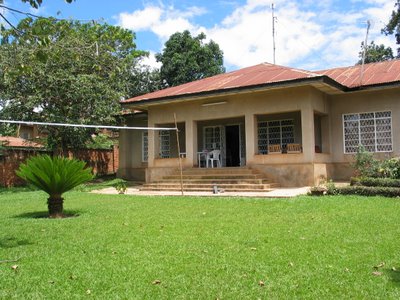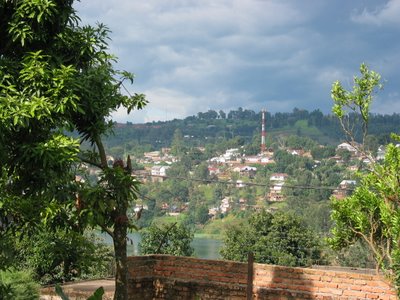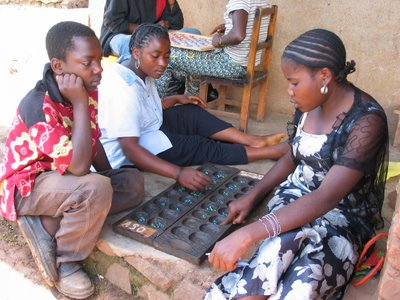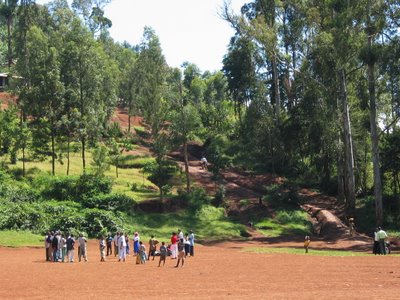Links
I'm having difficulty figuring out how to make the links on this page work. Until I do, I'd like to recommend the web sites of my friends, Katy and Bryan: katyincongo.blogspot.com and bgindrc.blogspot.com. I'd also like to recommend the "Women in Congo" photo gallery of the Malteser International organization, which is a branch of the Order of the Knights of St John of Malta - in existence since around 1050AD.
http://www.malteser.de/61.Malteser_International/en/default_en.htm
After four years in Rwanda and DR Congo I was diagnosed with myalgic encephalomyelitis in Oct ‘08. Following two years in Malta, I moved to Melbourne, Australia where I found a doctor who diagnosed fructose intolerance and - eventually - Lyme Disease. My health improved, I returned to work, and next week I'm going back to my former life on the Big Island of Hawaii. Take a look at older posts (2004-2008) for stories & photos from Africa.
Sunday, May 28, 2006
Saturday, May 27, 2006

The photos above are of some young people who come to one of the centers where we provide training to the staff. They have all been victimized first by poverty and then by the war. They have very little education and speak almost no French, so it's difficult for me to communicate with them. I haven't yet (in spite of my over-ambitious good intentions) learnt any Swahili. At first they didn't want to be photographed, but after one young woman asked me to take her photo, the others were keen for their pictures to be taken too. The center provides them with skills in trades such as soap-making, tailoring, and wood work. The majority of people here in town are unemployed, so learning skills is essential in order to have a chance of making a living in the future.

Two support staff from a local NGO participate in a creative arts training session. We provide paints, brushes, and training to local associations who work with orphans and marginalised children. Creative activities help the children to express themselves and gain confidence.

Music is a powerful tool in psychosocial support for young people. It helps them to feel good about themselves and each other. The young women here are dancing to the beat of a drum and music from shakers, or rattles, made locally from tin and filled with dried beans.
Wednesday, May 24, 2006
Children participating in activities designed to promote their psychosocial well-being. Bukavu, May 2006


Tuesday, May 23, 2006
Shukuru
Today I visited a small private primary school in a relatively pleasant neighbourhood on the outskirts of town. The school building is a partially completed house that is provided to the community by the owner (I'm not sure if rent is paid, but likely it is). The walls are bare bricks, the floor is packed dirt which probably turns to mud in the rain. The windows have wooden slats nailed across them, with barely any light coming through. Small classrooms are separated from each other with plastic sheeting. There is no electricity, no running water, and the latrines are indescribable, and certainly not suitable for girls reaching the age where they need a bit more privacy. Many young girls in Africa drop out of school simply because there are no suitable toilets for them to use.
The young head teacher told me that they began the school year with 300 pupils, but were now down to 250; the others had been sent away for non-payment of fees. Pupils pay $2.50 a month. That is an enormous sum for a parent who has several children and may only earn a dollar a day. Those who do earn a dollar a day are actually pretty lucky - the vast majority are unemployed and earn nothing. They barely scrape by, and many children die before the age of five. School fees go towards paying the teachers, paying various taxes, and mandatory insurance. And you can be certain that it's all a scam - they receive nothing in return for the taxes, and no insurance monies are ever paid out. It's a parody of what an education system should be: where the state should be paying teachers' salaries and building schools, not stealing from them.
Our session at the school began outside in the sun, with our trainers coaching the teachers in four large circles of young pupils playing games that are designed to improve their concentration, coordination skills, and mutual acceptance of each other. While I watched, a few neighbourhood kids, no more than 3 or 4 years old, sidled up to me. After a while, one slid his tiny hand into mine. I wondered how much affection some of these children get at home, where there are usually too many children, and parents too hassled with the struggle just to feed them to give them individual attention. Is that just a western concept? Don't all children need attention and affection? And while I was watching and thinking about these things, a young boy was suddenly in front of me. "I've been chased out", he told me, looking like his world was coming to an end. He's 11 years old, with worn clothing and inappropriate badly fitting boots, but clean and bright looking. His name is Shukuru; he wants to study. And today his dream just came to an end because his father doesn't have work and there's just no way he can pay his school fees.
Today I visited a small private primary school in a relatively pleasant neighbourhood on the outskirts of town. The school building is a partially completed house that is provided to the community by the owner (I'm not sure if rent is paid, but likely it is). The walls are bare bricks, the floor is packed dirt which probably turns to mud in the rain. The windows have wooden slats nailed across them, with barely any light coming through. Small classrooms are separated from each other with plastic sheeting. There is no electricity, no running water, and the latrines are indescribable, and certainly not suitable for girls reaching the age where they need a bit more privacy. Many young girls in Africa drop out of school simply because there are no suitable toilets for them to use.
The young head teacher told me that they began the school year with 300 pupils, but were now down to 250; the others had been sent away for non-payment of fees. Pupils pay $2.50 a month. That is an enormous sum for a parent who has several children and may only earn a dollar a day. Those who do earn a dollar a day are actually pretty lucky - the vast majority are unemployed and earn nothing. They barely scrape by, and many children die before the age of five. School fees go towards paying the teachers, paying various taxes, and mandatory insurance. And you can be certain that it's all a scam - they receive nothing in return for the taxes, and no insurance monies are ever paid out. It's a parody of what an education system should be: where the state should be paying teachers' salaries and building schools, not stealing from them.
Our session at the school began outside in the sun, with our trainers coaching the teachers in four large circles of young pupils playing games that are designed to improve their concentration, coordination skills, and mutual acceptance of each other. While I watched, a few neighbourhood kids, no more than 3 or 4 years old, sidled up to me. After a while, one slid his tiny hand into mine. I wondered how much affection some of these children get at home, where there are usually too many children, and parents too hassled with the struggle just to feed them to give them individual attention. Is that just a western concept? Don't all children need attention and affection? And while I was watching and thinking about these things, a young boy was suddenly in front of me. "I've been chased out", he told me, looking like his world was coming to an end. He's 11 years old, with worn clothing and inappropriate badly fitting boots, but clean and bright looking. His name is Shukuru; he wants to study. And today his dream just came to an end because his father doesn't have work and there's just no way he can pay his school fees.
Monday, May 22, 2006
Sunday, May 21, 2006
Contrasts
Last night I sat down and uploaded several photos and wrote some text, and then when I hit the "publish" button it all disappeared into that black internet hole. A bit frustrating! There are so many photos already that I'd like to post.
I spent yesterday afternoon drinking tea, reading a book, and chatting with other expat workers on the terrace of a lovely small hotel/restaurant located 20 minutes walk from our office. The terrace has a spectacular view over the lake, nearby islands and the hotel's garden which is a cascade of bamboo, lime trees, torch ginger, bougainvillea, and many other tropcial flowers sloping down to the lake shore. It is beautiful, serene, peaceful; the lake tranquil. The calm belies the terror hidden in the surrounding countryside, where ordinary people and their children are suffering violence and dying at an astounding rate, all but ignored by the international community.
I work with a team of eight local staff. They go out every day and train primary school teachers and staff at orphanages and transition centres for marginalised children. Young women and children are the sorriest victims in this unseen and incomprehenisble war - a mishmash of soldiers, military groups, rebels, armed gangs, all fighting over land, minerals, resources, power. The children have been orphaned by the fighting, some seeing parents murdered before their eyes; they are orphaned by HIV/AIDS; they are dragged into the conflict as child soldiers (both girls and boys) or join willingly on the promise of food; they are raped and then shunned by society; they are accused of witch craft and expelled from families that cannot feed them. But they are still children and young people with the same rights, feelings, and hopes for the future as young people everywhere.
Last night I sat down and uploaded several photos and wrote some text, and then when I hit the "publish" button it all disappeared into that black internet hole. A bit frustrating! There are so many photos already that I'd like to post.
I spent yesterday afternoon drinking tea, reading a book, and chatting with other expat workers on the terrace of a lovely small hotel/restaurant located 20 minutes walk from our office. The terrace has a spectacular view over the lake, nearby islands and the hotel's garden which is a cascade of bamboo, lime trees, torch ginger, bougainvillea, and many other tropcial flowers sloping down to the lake shore. It is beautiful, serene, peaceful; the lake tranquil. The calm belies the terror hidden in the surrounding countryside, where ordinary people and their children are suffering violence and dying at an astounding rate, all but ignored by the international community.
I work with a team of eight local staff. They go out every day and train primary school teachers and staff at orphanages and transition centres for marginalised children. Young women and children are the sorriest victims in this unseen and incomprehenisble war - a mishmash of soldiers, military groups, rebels, armed gangs, all fighting over land, minerals, resources, power. The children have been orphaned by the fighting, some seeing parents murdered before their eyes; they are orphaned by HIV/AIDS; they are dragged into the conflict as child soldiers (both girls and boys) or join willingly on the promise of food; they are raped and then shunned by society; they are accused of witch craft and expelled from families that cannot feed them. But they are still children and young people with the same rights, feelings, and hopes for the future as young people everywhere.


The narrow inlet of Lake Kivu around which most of Bukavu's expat community live; patrolled by MONUC - the UN mission in DR Congo.
Monday, May 01, 2006
First pictures from Bukavu
I arrived in Bukavu on Monday afternoon, after a 3 hour drive from Butare. We drove through Nyungwe Forest and saw a few black and white Colobus monkeys on the way. There are many differences here from my life in Butare. To begin with, this is a much larger town with many more people, and much more going on in the way of general commerce, markets, restaurants, and various offices and institutions. There's also a UN mission (MONUC) based here, with various MONUC buildings and other UN agencies around town. MONUC vehicles with armed soldiers regularly patrol the streets. A variety of police and other military groups are also frequently in evidence. The general population seem pretty relaxed about it all. The INGO expat staff are all linked into a security network with frequent radio checks (I have the two-way radio with me when at home, and carry it if I go out in the evening). All the INGOs are located in one small area of town close to the border with Rwanda, and the area is regularly patrolled by MONUC. I'm glad I had the security training while in Holland.
Work is very different from before. I'm with a much smaller organisation, with only two expats here. Some things are much more efficient: I had a new laptop immediately, and business cards within two days (they took almost two years on my last job - I received them just a few weeks before leaving!). On the other hand the office and living quarters are combined in a small house, and I find this a little strange. Our living room doubles as a meeting room, with my desk in a corner. The advantage is that I have internet access most of the time (unless it's down). Once we move to separate house and office (as planned, when we can find something suitable), then there'll be no internet access at home. For the time being my personal space consists of one bedroom, so I have yet to unpack most of my things. I had a large portion of a six-bedroom house to myself before, so this requires some adjustment! At least I still have a view, and from my desk I can gaze out the window and look across at the hillside which is Rwanda, just across the narrow inlet of lake that lies between our hillside and the opposite one.
A few other differences: people here are generally much friendlier and more easy-going than in Rwanda. Social events are far less formal, as evidenced by the leaving party held for a colleague here compared with the one held for me when I left Butare. And even though everyone in Butare seemed convinced that prices in Bukavu would be cheaper, everything here is much more expensive than in Rwanda - except, for some inexplicable reason, powdered milk, which is considerably cheaper. So far I've already been out to four different restaurants in town, out of which three were pretty good and one was just average. Service is faster than in Rwanda - thank goodness! Gerda's place (the subject of the New York Times travel article, posted earlier) is very good, with a modern, bright decor - all exotic flowers and plenty of the local carved figures which Congo is famous for.

The office/house with a volleyball net on the front lawn - a rare small piece of flat land on the slopes surrounding Lake Kivu.

Looking across the inlet to Rwanda - the red and white antenna tower marks the border between Rwanda and DRC.
I arrived in Bukavu on Monday afternoon, after a 3 hour drive from Butare. We drove through Nyungwe Forest and saw a few black and white Colobus monkeys on the way. There are many differences here from my life in Butare. To begin with, this is a much larger town with many more people, and much more going on in the way of general commerce, markets, restaurants, and various offices and institutions. There's also a UN mission (MONUC) based here, with various MONUC buildings and other UN agencies around town. MONUC vehicles with armed soldiers regularly patrol the streets. A variety of police and other military groups are also frequently in evidence. The general population seem pretty relaxed about it all. The INGO expat staff are all linked into a security network with frequent radio checks (I have the two-way radio with me when at home, and carry it if I go out in the evening). All the INGOs are located in one small area of town close to the border with Rwanda, and the area is regularly patrolled by MONUC. I'm glad I had the security training while in Holland.
Work is very different from before. I'm with a much smaller organisation, with only two expats here. Some things are much more efficient: I had a new laptop immediately, and business cards within two days (they took almost two years on my last job - I received them just a few weeks before leaving!). On the other hand the office and living quarters are combined in a small house, and I find this a little strange. Our living room doubles as a meeting room, with my desk in a corner. The advantage is that I have internet access most of the time (unless it's down). Once we move to separate house and office (as planned, when we can find something suitable), then there'll be no internet access at home. For the time being my personal space consists of one bedroom, so I have yet to unpack most of my things. I had a large portion of a six-bedroom house to myself before, so this requires some adjustment! At least I still have a view, and from my desk I can gaze out the window and look across at the hillside which is Rwanda, just across the narrow inlet of lake that lies between our hillside and the opposite one.
A few other differences: people here are generally much friendlier and more easy-going than in Rwanda. Social events are far less formal, as evidenced by the leaving party held for a colleague here compared with the one held for me when I left Butare. And even though everyone in Butare seemed convinced that prices in Bukavu would be cheaper, everything here is much more expensive than in Rwanda - except, for some inexplicable reason, powdered milk, which is considerably cheaper. So far I've already been out to four different restaurants in town, out of which three were pretty good and one was just average. Service is faster than in Rwanda - thank goodness! Gerda's place (the subject of the New York Times travel article, posted earlier) is very good, with a modern, bright decor - all exotic flowers and plenty of the local carved figures which Congo is famous for.

The office/house with a volleyball net on the front lawn - a rare small piece of flat land on the slopes surrounding Lake Kivu.

Looking across the inlet to Rwanda - the red and white antenna tower marks the border between Rwanda and DRC.
Subscribe to:
Comments (Atom)












